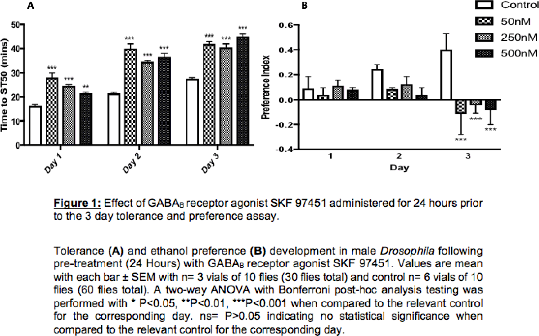Print version
Search Pub Med
| 005P London, UK Pharmacology 2017 |
Role of GABAB receptors in ethanol induced behaviours
Introduction: The Drosophila melanogaster, has been shown to respond to alcohol by developing addiction like behaviours such as tolerance and alcohol-seeking preference behaviours and it has been proposed as a model to investigate mechanisms of addiction. To understand the role of the GABAB receptor in the onset and maintenance of addiction like behaviours, the GABAB receptor agonist SKF 97451 and the antagonist CGP 54626 were used to challenge the development of tolerance and preference to alcohol in wild type flies and in mutant flies with putative disruptions of the GABAB receptor 1 or 2 subunit genes.
Method: The CAFE (capillary two-choice feeder) assay, described by Devineni et al. (2012) (1), was used to measure the development of preference to ethanol in all fly lines with and without prior administration (24 hours) of SKF 97541 and CGP 54626 independently of each other. The drugs were also administered for 24 hours before and during the development of tolerance to ethanol following a methodology similar Maples and Rothenfluh (2011) (2). All assays were n=6 with 10 flies per assay (60 flies total).
Results: The antagonist and agonist were administered to wild type flies and GABA-B receptor knock out (KO) mutants for 24 hours before the tolerance assay. The antagonist was able to increase the time at which 50% of the flies were sedated and the agonist appeared to be semi effective. This could be due to the drug only working as a partial agonist. The agonist also appears to work in the preference assay by reducing preference at day 3. KO of GABAB R1 and R2 subunits did not alter the development of tolerance or preference but it altered the response of the flies to the agonist and antagonist to these ethanol-induced behaviours. The GABAB R1 KO was able to display a drug induced increase in tolerance and the drugs effect on preference was reduced.
Conclusion: The data provides new evidence that the GABAB receptors are involved in modulating the process of ethanol tolerance and preference in Drosophila. Further work with different mutant flies and drug deliveries will allow to better define the role of these receptors in alcohol addiction.

References:
1) Devineni, A. V et al. (2012). Proc Natl Acad Sci U S A 109(51): 21087-21092.
2) Maples, T et al. (2011). " J Vis Exp(48).

